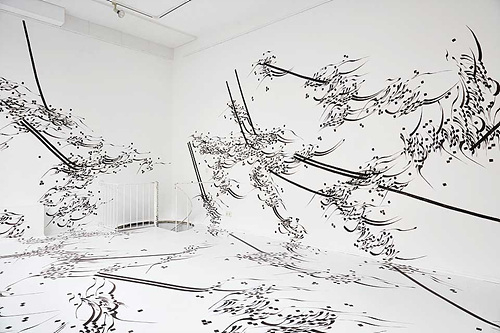
Written Room
Parastou Forouhar
You are now standing inside a room covered in densely drawn black ink—walls and floor inscribed with unfamiliar script. These flowing signs are Persian letters, hand-written over ten days by the artist Parastou Forouhar. The installation, Written Room, will disappear once the exhibition ends. Every trace will be erased.
This act of vanishing is not incidental—it is the core of the work. Through this ephemeral space, Forouhar reflects on exile, absence, identity, and memory. Born in 1962 in Tehran, Iran, she lost her freedom in the aftermath of the Iranian Revolution and emigrated to Germany in 1991. Much of her work draws on her experience as a perpetual outsider and the personal trauma of losing both parents to political assassination.
“In Germany, I’m called Iranian. In Iran, I’m called German.
So my art builds a space in between—belonging to no one.”
– Parastou Forouhar
Written Room is not only about Iran. It also critically questions and dismantles Orientalism—the Western gaze that turns non-Western cultures into symbols, aesthetics, or curiosities. The text is illegible to most viewers, and this very unreadability exposes the mechanisms of cultural misrecognition. The calligraphy may be consumed as decoration, but Forouhar uses this reaction to reveal the limits of cultural translation and the biases embedded in perception.
“This is the body of my mother tongue.
It no longer speaks, but becomes memory, grief—
and perhaps a new possibility for sensation.”
Since 1999, Written Room has been created and erased in cities across the world. Now, it reappears as a temporary presence at the 2025 Jeonnam International Sumuk Biennale.
Much like sumukhwa (ink painting), which expresses emotion and spirituality through brush and ink, Forouhar’s written forms transcend language—becoming pure resonance. In these unreadable letters,
we don’t “understand”—
we feel.
This act of vanishing is not incidental—it is the core of the work. Through this ephemeral space, Forouhar reflects on exile, absence, identity, and memory. Born in 1962 in Tehran, Iran, she lost her freedom in the aftermath of the Iranian Revolution and emigrated to Germany in 1991. Much of her work draws on her experience as a perpetual outsider and the personal trauma of losing both parents to political assassination.
“In Germany, I’m called Iranian. In Iran, I’m called German.
So my art builds a space in between—belonging to no one.”
– Parastou Forouhar
Written Room is not only about Iran. It also critically questions and dismantles Orientalism—the Western gaze that turns non-Western cultures into symbols, aesthetics, or curiosities. The text is illegible to most viewers, and this very unreadability exposes the mechanisms of cultural misrecognition. The calligraphy may be consumed as decoration, but Forouhar uses this reaction to reveal the limits of cultural translation and the biases embedded in perception.
“This is the body of my mother tongue.
It no longer speaks, but becomes memory, grief—
and perhaps a new possibility for sensation.”
Since 1999, Written Room has been created and erased in cities across the world. Now, it reappears as a temporary presence at the 2025 Jeonnam International Sumuk Biennale.
Much like sumukhwa (ink painting), which expresses emotion and spirituality through brush and ink, Forouhar’s written forms transcend language—becoming pure resonance. In these unreadable letters,
we don’t “understand”—
we feel.
